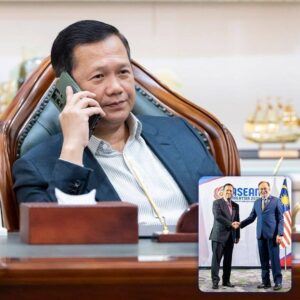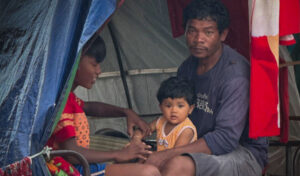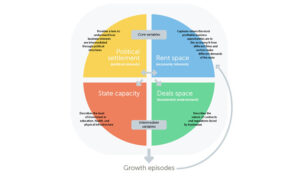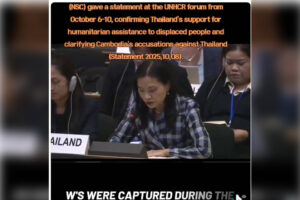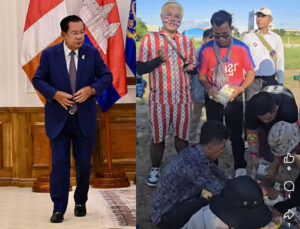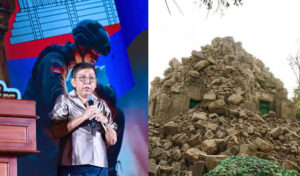Opinion: Only the guilty are afraid of the UN and ICJ
Cambodia remains committed to resolving its border row with Thailand through peaceable means. YouTube image
Khmer Times | In a July 6, 2025 article, the Bangkok Post accused Cambodia of “breaking its promise” and escalating the border dispute with Thailand. This assertion is not only misleading—it deliberately distorts reality. The Cambodian government has consistently upheld its commitment to peaceful dialogue and international legal frameworks, while it is Thailand that has undermined regional stability through military provocation and diplomatic doublespeak.
Who broke the promise?
Cambodia has broken no promises. We remain committed to resolving the border issue through peaceful means, grounded in bilateral talks and, when those fail, through internationally recognised mechanisms.
On May 28, Thai troops unlawfully crossed into Techo Morokot village in Preah Vihear province and opened fire—killing a Cambodian soldier. That was not a misunderstanding; it was a direct violation of the trust that underpins our bilateral relationship. Cambodia did not retaliate with force. Instead, we chose diplomacy, bringing the matter to the United Nations and urging international attention. That is not escalation—it is restraint, responsibility, and respect for international law.
The 2000 Memorandum of Understanding (MoU) between Cambodia and Thailand explicitly provides for third-party mechanisms if bilateral negotiations reach an impasse. Cambodia’s appeal to the UN General Assembly is not a breach—it is a legal right. To frame this as “unilateralism” is to ignore both the text and the spirit of the MoU.
Thailand’s double standard
It is profoundly hypocritical for the Thai Foreign Ministry to express “disappointment” over Cambodia’s legal actions while Thai troops continue to entrench themselves in contested zones, construct unauthorised fortifications, and close border crossings without consultation.
Even more troubling, Thailand has abandoned internationally recognised maps—particularly those tied to the 1904 and 1907 Franco-Siamese treaties—and the binding 1962 ICJ ruling on Preah Vihear. Instead, it uses its own unilateral interpretations to justify incursions, all while accusing Cambodia of overreach.
Let’s be clear: Cambodia is not escalating—it is defending. We are defending our territory, our people, and our sovereign rights under international law.
Going to the UN is not an act of hostility but responsibility
Thailand’s claim that Cambodia bypassed consultation by raising the issue at the UN is hollow. How many consultations has Thailand stalled or sabotaged? The most recent Joint Border Commission talks collapsed precisely because Thailand refused to accept treaty-based maps as the basis for negotiation.
In such circumstances, what options remain? Silence? Submission? No. When dialogue fails and one party acts in bad faith, the responsible course is international legal recourse. That is what global institutions exist for. Thailand should have nothing to fear—unless it fears the truth.
The responsibility lies with Bangkok
While Cambodians rally peacefully to defend sovereignty and uphold international norms, it is Thai citizens—especially those along the border—who are suffering from this manufactured crisis.
Cross-border trade has stalled. Border communities are facing economic despair. And frustration is mounting—not against Cambodia, but toward a Thai government that refuses to lead with transparency or accountability.
Instead of lashing out at Cambodia, Thai leaders should answer to their own people. Why are livelihoods being sacrificed for nationalist theatrics? Why is dialogue being replaced with trenches and troop movements? The burden of responsibility lies not with Phnom Penh—but with Bangkok.
Let diplomacy, not denial, prevail
Cambodia continues to call for dialogue, legal clarity, and peaceful coexistence. We are open to international mediation. We welcome the jurisdiction of the ICJ. We do not fear the truth. What we reject is bullying disguised as diplomacy and political provocation masquerading as victimhood.
If Thailand is confident in its claims, it should meet Cambodia at the ICJ—not hide behind press statements and border blockades. Because in the end, only those with something to hide fear the UN and International Court of justice.
The author is a geopolitical analyst based in Phnom Penh. The views expressed are his own.


